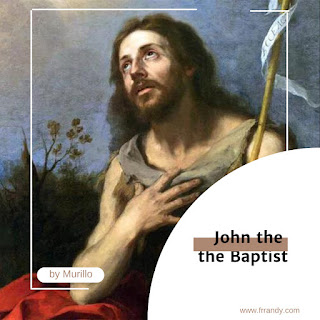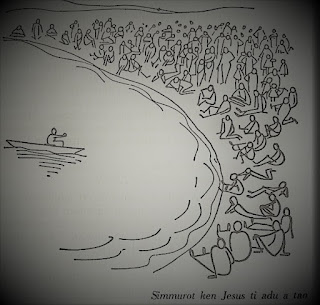The Gospel Reading for the first day of "Simbang-Gabi" (Dec 15) and for the coming days take us into the life and ministry of John the Baptist.
Amen, I say to you, among those born of women, there has been none greater than John the Baptist; yet the least in the kingdom of heaven is greater than he" (Mat 11:11 // Luke 17:21).
All four Gospels show that John the Baptist is an important figure. Every time we tell the story of Jesus, especially the story of his birth, we need then to take into account John the Baptist. Outside the Gospels, the Jewish historian Josephus writing in the first century A.D. spoke highly of John the Baptist as well:
“He was a good man and had exhorted the Jews to lead righteous lives, to practice justice toward their fellows and piety toward God, and so doing to join in baptism.”
The evangelist Mark, whose written Gospel is deemed the earliest, depicts John the Baptist as the prophet Elijah in disguise, a forerunner of a Messiah whose identity is likewise concealed. The evangelist Luke brings John the Baptist into a closer relationship with Jesus by making the two relatives and narrating the stories of their birth in parallel but adds a plus to Jesus (example: Virgin birth). The fourth evangelist John presents the Baptist, not as a forerunner but as the first witness to Jesus.
According to the late New Testament scholar, Fr. John P. Meier, the portrait of John the Baptist by the evangelist Matthew is the “most puzzling and difficult to understand.” Chapter 3 and chapter
11 (from where our Gospel Reading is taken) contain the most materials about the Baptist.
In chapter 3, Matthew underlines the Baptist’s view of Jesus and himself; in chapter 11 in turn is Jesus’ view of himself and the Baptist. We must remember in chapter 3 that the Baptist does not proclaim a “baptism of repentance” (as in Mark) but instead a call to repentance—not the performance of a ritual but an interior change or conversion: “Repent, for the kingdom of heaven is at hand!” (Mat 3:2).
At Jesus’ baptism, Jesus and the Baptist enter into a dialogue. Stressing his inferiority, the Baptist objects to baptizing the one who is supposed to be baptizing him: “I need to be baptized by you, yet you are coming me?” (3:14).
Jesus, on the other hand, does not second John’s feeling of inferiority: “Allow it for now, for thus it is fitting for us to fulfill all righteousness” (3:15). “To fulfill all righteousness” means the carrying
out of God’s plan of salvation as prophesied in the Old Testament.
John the Baptist does not stand outside of this plan nor merely prepares for this plan; nor does he only point to the Fulfiller (Jesus) as did the Law and the Prophets. The Baptist himself is fulfilling the
Father’s saving plan of history.
The next passage, Mat 11:2-11, the Gospel Reading for Dec 15 and also for the Third Sunday of Advent, begins the third book in a five-book division of Jesus’ public ministry in Matthew’s Gospel. Book III (Matthew 11-12) focuses on the disbelief and opposition on the part of Jesus’ friends and foes including his own relatives. The Baptist himself is at a loss for the identity of Jesus. In prison, he heard about the “messianic works” of Jesus but was is sure if he was indeed the “one who is to come.” The Baptist expected a Messiah who is terrifying, a fire-breathing judge (Mat 3:11) one who pronounces fiery judgment and shocking indictment and divine punishment like the prophets of the Old Testament. He did not expect a messiah who comes to proclaim the good news of mercy, healing, and forgiveness. The Baptist then sends his own disciples to inquire.
Jesus’ response echoes the prophecy of Isaiah in the eighth centuryB.C. (the First Reading): the blind see, the lame walk, the lepers are healed, the deaf hear, the dead have life; the poor hear the good news (Mat 11:5; also Isa 35:1-6). Jesus assures the Baptist that he is the prophesied Messiah, but of a different type.
This section ends with a gentle warning from Jesus addressed to the Baptist in a form
of a beatitude: “And blessed is the one who takes no offense at me” (11:6). Jesus appeals to the Baptist not to stumble and fall from faith, not to succumb to unbelief like what others have
done, not to satisfy his own fantasies of what he likes and expects the
Messiah to be.
After this seemingly low regard for John the Baptist, Jesus now speaks highly of him in the next passage (vv. 7-11a).
Jesus perceives the Baptist as a man of principle and not a
vacillating crowd-pleaser like a “reed swayed by the wind” (v. 7); a man
of simplicity but of fortitude, not “dressed in fine clothing”
but camel’s hair and leather belt; he does not live in royal
palaces but is in prison. Thus for Jesus, the Baptist is more than a prophet;
he is the messenger of the end-time of whom the prophet Malachi spoke, the messenger sent by God to prepare the way of the Messiah
(v.10; also Mal 3:1). In fact, there has been no one born of
women greater than John the Baptist! (v. 11a). The last phrase of
this passage is puzzling, however: “yet the least in the kingdom of
heaven is greater than he” (v. 11b).
Fr. Meier proposes to understand the phrase above in the context of Matthew’s three-fold division of salvation
history: the Old Testament, the time of Jesus, and the time of the
Church. The Old Testament is the time when the Law and the Prophets
pointed to the Messiah; the time of Jesus, the mid-point, is the
period in which Jesus proclaims the good news although primarily to the chosen people (“the lost sheep of Israel”); the time of the
church begins with the momentous, earth-shattering apocalyptic
event of Jesus’ death and resurrection, destroys the barriers of
law and race and outspreads the mission to the Gentiles. John the
Baptist is at the mid-point of salvation history. Because he lives in the time of Jesus and is even uniquely paralleled with Jesus.
The Baptist
is greater than any person who was born before this stage. But the one
who lives in the time of the Church—the eschatological period
which is marked by Jesus’ death and resurrection, the most important
event in Matthew’s salvation history—is particularly privileged
even if he or she is the least in the kingdom of heaven (that is,
during the time of the Church).
John the Baptist is a fitting symbol of Advent: preparing for the Lord’s coming, calling for interior change, simple
living, standing for what is right, and just with fortitude. But we
can also be greater than John the Baptist—we are privileged to be born
in this time of the Church, the eschatological period after
Jesus’ resurrection.
The evangelists Matthew and Luke remind us of this
honor and dignity whenever we read this passage they composed more than 2,000 years ago—a reading chosen and fitting for Gaudete Sunday A (from Matthew), and for the first evening of the Simbang Gabi (from the version of Luke).
Reference: John P. Meier, “John the Baptist in Matthew’s
Gospel,” Journal of Biblical Literature 99 (1980):383-405.



Comments
Post a Comment